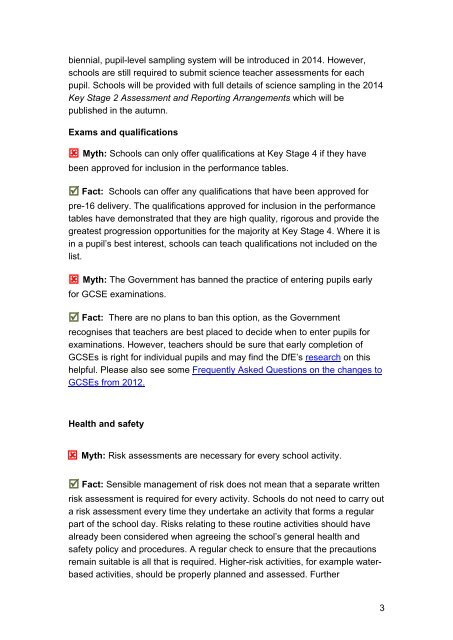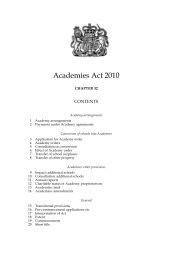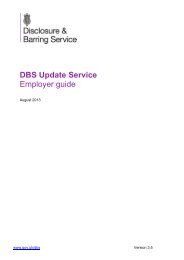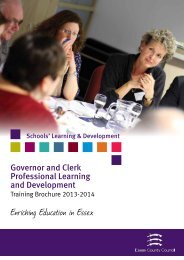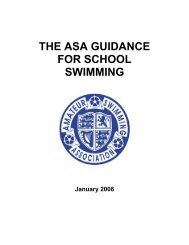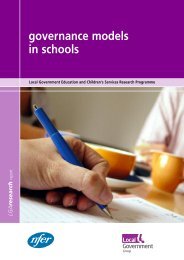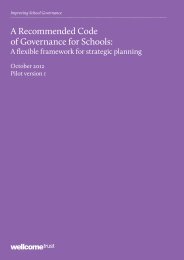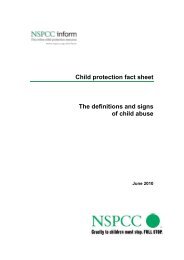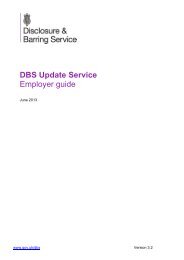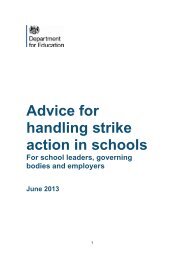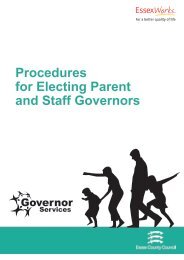Myths and facts for schools DfE updated 1 ... - the Essex Clerks
Myths and facts for schools DfE updated 1 ... - the Essex Clerks
Myths and facts for schools DfE updated 1 ... - the Essex Clerks
You also want an ePaper? Increase the reach of your titles
YUMPU automatically turns print PDFs into web optimized ePapers that Google loves.
iennial, pupil-level sampling system will be introduced in 2014. However,<br />
<strong>schools</strong> are still required to submit science teacher assessments <strong>for</strong> each<br />
pupil. Schools will be provided with full details of science sampling in <strong>the</strong> 2014<br />
Key Stage 2 Assessment <strong>and</strong> Reporting Arrangements which will be<br />
published in <strong>the</strong> autumn.<br />
Exams <strong>and</strong> qualifications<br />
Myth: Schools can only offer qualifications at Key Stage 4 if <strong>the</strong>y have<br />
been approved <strong>for</strong> inclusion in <strong>the</strong> per<strong>for</strong>mance tables.<br />
Fact: Schools can offer any qualifications that have been approved <strong>for</strong><br />
pre-16 delivery. The qualifications approved <strong>for</strong> inclusion in <strong>the</strong> per<strong>for</strong>mance<br />
tables have demonstrated that <strong>the</strong>y are high quality, rigorous <strong>and</strong> provide <strong>the</strong><br />
greatest progression opportunities <strong>for</strong> <strong>the</strong> majority at Key Stage 4. Where it is<br />
in a pupil’s best interest, <strong>schools</strong> can teach qualifications not included on <strong>the</strong><br />
list.<br />
Myth: The Government has banned <strong>the</strong> practice of entering pupils early<br />
<strong>for</strong> GCSE examinations.<br />
Fact: There are no plans to ban this option, as <strong>the</strong> Government<br />
recognises that teachers are best placed to decide when to enter pupils <strong>for</strong><br />
examinations. However, teachers should be sure that early completion of<br />
GCSEs is right <strong>for</strong> individual pupils <strong>and</strong> may find <strong>the</strong> <strong>DfE</strong>’s research on this<br />
helpful. Please also see some Frequently Asked Questions on <strong>the</strong> changes to<br />
GCSEs from 2012.<br />
Health <strong>and</strong> safety<br />
Myth: Risk assessments are necessary <strong>for</strong> every school activity.<br />
Fact: Sensible management of risk does not mean that a separate written<br />
risk assessment is required <strong>for</strong> every activity. Schools do not need to carry out<br />
a risk assessment every time <strong>the</strong>y undertake an activity that <strong>for</strong>ms a regular<br />
part of <strong>the</strong> school day. Risks relating to <strong>the</strong>se routine activities should have<br />
already been considered when agreeing <strong>the</strong> school’s general health <strong>and</strong><br />
safety policy <strong>and</strong> procedures. A regular check to ensure that <strong>the</strong> precautions<br />
remain suitable is all that is required. Higher-risk activities, <strong>for</strong> example waterbased<br />
activities, should be properly planned <strong>and</strong> assessed. Fur<strong>the</strong>r<br />
3


